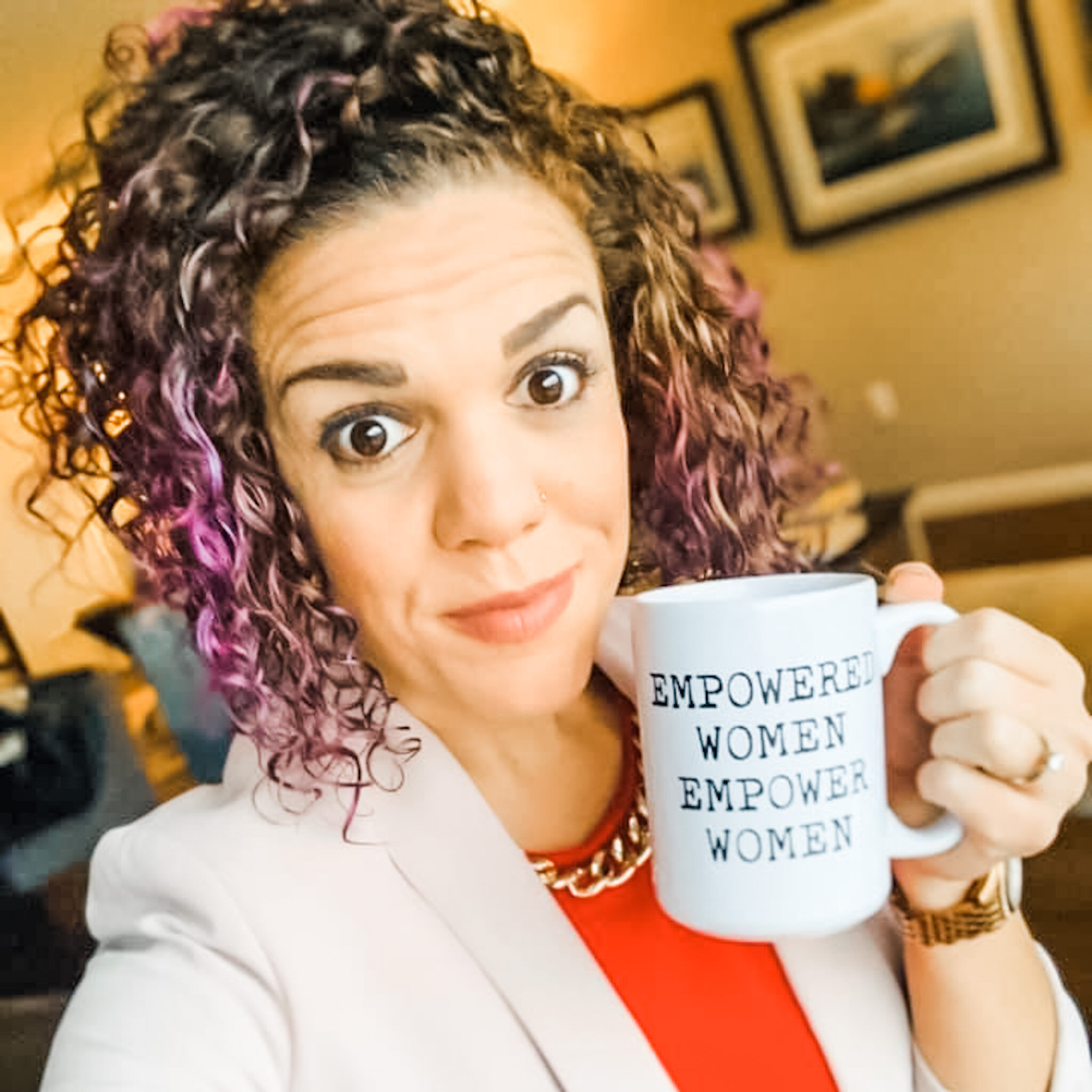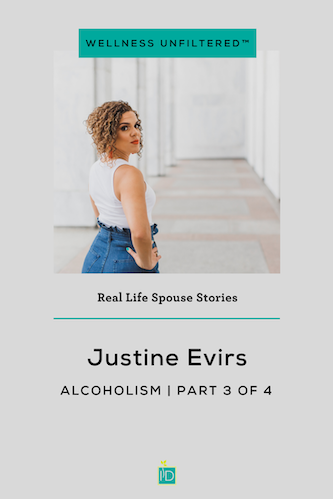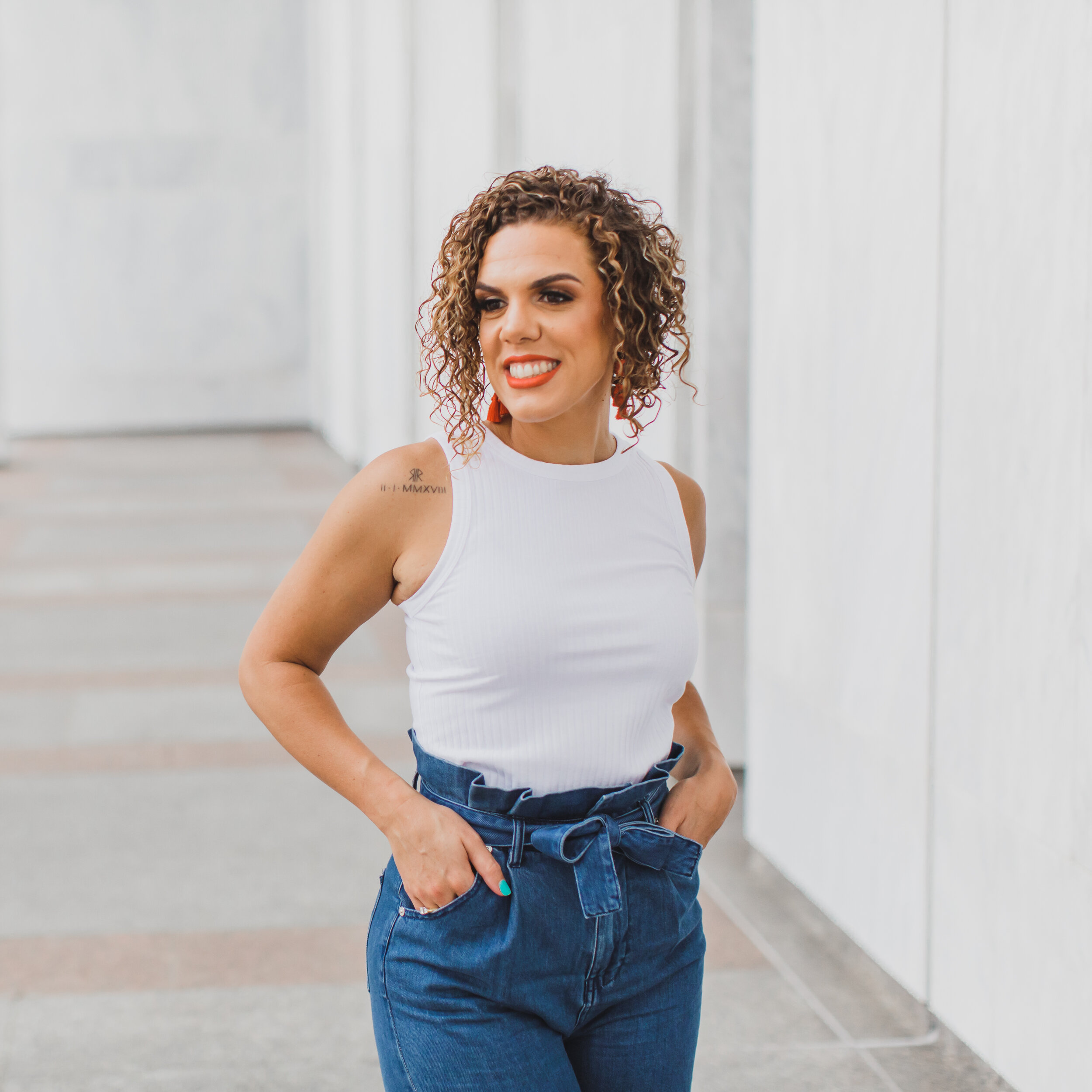Real Life Spouse Story | Justine Evirs | Alcoholism Part 3
The Real Life Spouse Stories Series is part of our Wellness Unfiltered™ program. It’s a platform for military spouses to share their struggles with tougher wellness topics in a Facebook Live series. They’re sharing these stories to help with their healing, open up conversations so other military spouses know that they aren’t alone, provide resources to people struggling with something similar, and to help the community know how to better help others who are going through difficult wellness issues. Below is an excerpt of Justine’s feature.
Justine Evirs
“Stage 3 is a dangerous stage. It’s the stage when I found myself at my rock bottom.”
Justine Evirs is a social entrepreneur and visionary who is focused on creating change in a digital world for underrepresented populations. As a Navy veteran, Navy spouse, and first generation college graduate, she is proud of the work she has accomplished in an eight-year higher education career. During that time she was well known for her ability to build innovative programs and her unique servant leadership style.
This is part three of my four-part series covering the four stages of alcoholism. My intention is to share my story, some things that I have learned along the way, and some helpful resources. If I can help one person, sharing my story will be worth it. Alcoholism among military spouses is something we need to talk more about.
It you didn’t catch the Part 1 and Part 2 blog posts and Facebook Lives, that’s a great place to begin before jumping into my Stage 3 story. One of the biggest red flags from Stage 1 was my inability to get through a stressful situation without drinking and in Stage 2 it was that I developed an inability to resist.
Can you do a quick recap of Part 1 and Part 2?
In Part 1, we looked at Stage 1 of alcoholism and highlighted the definition of alcoholism and provided education on the four stages of the disease. We talked a lot about how I developed the habit of managing stress with alcohol. In Part 2, we looked at Stage 2 of alcoholism and I talked a lot about how I quickly developed the inability to resist alcohol. I also shared a lot of research and then my story alongside those facts to support how the progression of alcoholism can sneak up on you if you don’t arm yourself with the facts.
What happens in Stage 3 of alcoholism?
According to alcohol.org, Stage 3 is the middle alcoholic stage. Characteristics of this stage include falling short on your responsibilities, drinking at inappropriate times, and noticing body changes. Friends and family start to notice.
How long have you been sober?
I just celebrated two years of sobriety on February 1, 2020.
Why is it hard for you to call yourself an alcoholic?
It is still so hard for me to identify as an alcoholic because I had a lot of misconceptions of what that term meant. When I think of an alcoholic, I don’t think of me. I’m a serial entrepreneur, mom of three, military spouse, Stanford alumna, and social impact leader. I don’t know about you, but I always thought of alcoholics as being male, divorced, unemployed, homeless, and/or angry. Now in hindsight I know that I was on my way to a divorce, definitely angry, and not too far away from being unemployed. I also think it is easy for me to talk myself into thinking that I am cured but I have to be reminded that there is no cure for alcoholism other than sobriety.
Why is it important for you to share your story?
Sharing my story is extremely important to me because I think if I would have heard a young woman, mom, and career driven military spouse speak openly about her alcoholism, I would have seen myself in her sooner.
Why is it especially important for high functioning alcoholics to speak up?
Once we are in recovery, I think it is important for us to speak up because when we are honest about our struggles we debunk the myth of perfectionism.
What happened to you in Stage 3?
Stage 3 was a dangerous stage. It’s the stage when I found myself at my rock bottom. It’s the stage when things escalated from social/heavy drinking to drinking alone a lot and even starting to secretly drink during the day.
When did you start Stage 3 and what life changes were you dealing with during that time?
I can clearly remember really increasing my alcohol intake daily during our last deployment about six years ago. Abruptly moving across the country from Hawaii to Virginia with three kids and a dog, giving up my job to live in a new house with no furniture for fifty-seven days broke me. We PCSed from Virginia to San Francisco. I found a new job and then a year and a half into our time in San Francisco, I had a career change from higher education to entrepreneurship and starting my first company.
How did loneliness contribute to Stage 3?
At this point in my life I was juggling deployments, cross country moves, and remote work. I was extremely lonely but too afraid to admit it so I just continued to drink my feelings.
What do friends and family start to notice in Stage 3?
I can only speak for myself. As I look back, in hindsight I think my close friends and family started to notice that I drank differently when I never wanted to party to end. I also always encouraged everyone around me to drink more so I would feel comfortable drinking more.
Did you recognize yourself as an alcoholic yet in Stage 3?
No, to be honest. Toward the end, I avoided myself. I just masked everything with alcohol. I was in denial. I didn’t have a problem… Everyone else around me had a problem.
Does your life start to fall apart in Stage 3?
Yes! This is when the people you surround yourself with don’t want to hang out with you anymore. This is when your reputation starts to change from a ton of fun to someone who takes it too far.
What did things look like on a day-to-day basis in Stage 3?
Since I was a very high-functioning alcoholic at this point in my life, on the outside everything looked put together and peachy, but the inside of me was a mess. Toward the end of my drinking career, I remember secretly pouring whiskey as soon as my family left in the morning to get rid of a hangover and then talking myself into having a few more throughout the day since no one was around. I never felt like I had enough. I always wanted more . . . and I was super cranky if I didn’t get it.
What did you use alcohol to mask?
Everything. Remember, I never managed stress without it since I started drinking at the age of thirteen. As I grew up, I battled physical abuse, verbal abuse, and sexual assault on several occasions and I never dealt with it.
What was the hardest part of addiction?
Shame and guilt. I remember feeling like this would never pass and life wasn’t worth living anymore.
How did shame and guilt play into Stage 3?
Shame and guilt came full circle for me in Stage 3. The abuse and emotions that had piled on since the age of thirteen came crashing down. It just became too much for me to handle so I preferred to stay drunk or buzzed so I wouldn’t have to deal with the pain. For me, it was the solution, and wasn’t a problem until it was.
Does willpower work in Stage 3?
No. I tried, and I like to think I am one tough woman. I remember waking up and telling myself I wasn’t going to drink that day and only make it until noon or at best some days I would make it until five p.m. As soon as I had my first drink, I felt like a failure and then would find myself unable to stop. I prayed to find the strength to stop every night. I hated myself. I felt so weak and so ashamed of my addiction.
How can you get out of Stage 3?
Asking for help and seeking help. At this stage in alcoholism finding professional or anonymous help is truly the easier, softer way.
What makes asking for help hard?
The stigma around addiction on top of my resistance to asking for help in general made asking for help hard. I felt like a failure because I couldn’t drink like everyone else. I wanted to be able to drink like everyone else so badly. I talked to myself so negatively because I felt like I was not strong enough.
What led you to quit drinking?
My husband had a very loving but concerning conversation with me. It was the moment that I realized I loved alcohol more than I loved myself. On the way home from having our “I need help” conversation, we listened to a podcast on alcoholism and Elizabeth Vargas was a guest. I saw myself in her and I think it was the first time I saw a young woman, mom, and career-driven woman call herself an alcoholic.
What happened in the first ninety days?
The first ninety days for me were filled with a lot of journaling, mood swings, panic attacks, depression, and suicidal thoughts.
How did therapy and a 12-step program help you?
Life changing. I tried to stay sober without these tools and I was miserable. I was sober, but I was miserable. A 12-step program and therapy have allowed me to find joy and happiness in ways I didn’t think were possible. I wish I would have had the courage to go to rehab or start a 12-step program sooner. The programs really work and they get to the root of the addiction in a non-traumatic and very supportive way.
What would happen if you were to take a drink now?
My addiction would pick right back up where it stopped, which is Stage 3. I think I would quickly down spiral and move into Stage 4 because I would be so ashamed of relapsing.
Why is your recovery your superpower?
Radical honesty. I am able to admit my weaknesses and flaws quicker than I have ever been able to before.
What would you say to military spouses who are seeing themselves in your story today?
Find help. Alcoholics Anonymous truly is anonymous and there are people there who will be more than happy to help you. If you aren’t able to get to an in-person meeting right now, there are several online options listed under resources below. If you aren’t ready for those rooms, please send me a message. I am happy to help in confidence. Send me a message via Facebook (we don’t have to be FB friends for you to send me a message), LinkedIn, or email.
What resources are available to military spouses?
Therapy is free for us now and easier to get access to than ever before. You don’t have to go on base. You can find any location in your local area, ask if they accept Tricare and if so then you can see them. Please take advantage of it whether you are struggling with addiction or not.
Resources
How to help an Alcoholic
Virtual AA Meetings
Between Breaths - A Memoir of Panic and Addiction by, Elizabeth Vargas
This Naked Mind - Control Alcohol. Find Freedom, Discover Happiness & Change Your Life by Annie Grace
Alcoholism | Part 3 of 4
ABOUT JUSTINE
Justine Evirs
Justine Evirs is a Social Entrepreneur and Visionary who is focused on creating change in a digital world for underrepresented populations. She is currently serving as the President and Founder of The Paradigm Switch (TPS), which is a digital nonprofit that teaches military spouses how to work anywhere in the world. TPS’s Digital Career Bootcamp offers four high-impact, low cost programs that serve as a catalyst for digital transformations of individuals and corporations across the globe. As a Navy veteran, Navy spouse, and a first generation college graduate, Justine is proud of the work she has accomplished in an eight-year higher education career. During that time she was well known for her ability to build innovative programs and her unique servant leadership style. In 2017, she set out to make a larger difference in the world, which led her to find her new found love for innovation & entrepreneurship.














